Nature offers several excellent sugar-free tea sweeteners to satisfy your sweet tooth without the guilt. Stevia leaf extract and monk fruit sweetener are popular zero-calorie options, providing intense sweetness without affecting blood sugar levels. Xylitol from birch trees offers dental benefits, while raw honey, though not sugar-free, boasts antimicrobial properties. For unique flavors, try licorice root or yacon syrup. Coconut sugar and organic maple syrup provide trace minerals and a lower glycemic index compared to regular sugar. Each sweetener has its own characteristics and potential health benefits, making your tea-drinking experience both delicious and nutritious. Explore these options to find your perfect cup.
Stevia Leaf Extract
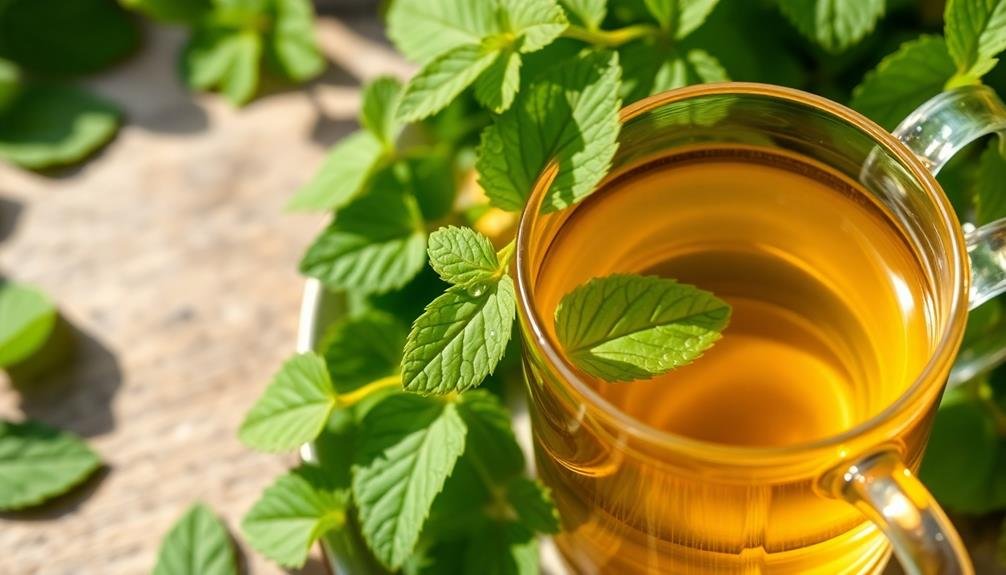
In light of the growing demand for natural sweeteners, stevia leaf extract has emerged as a popular choice for tea enthusiasts. This zero-calorie sweetener comes from the leaves of the Stevia rebaudiana plant, native to South America. You'll find stevia in both liquid and powdered forms, making it easy to add to your favorite hot or cold teas.
Stevia's sweetness is intense, with some varieties being up to 300 times sweeter than sugar. This means you'll need only a small amount to achieve the desired sweetness in your tea.
It's crucial to recognize that stevia doesn't affect blood sugar levels, making it an excellent option for those managing diabetes or watching their sugar intake.
When using stevia, start with a small amount and adjust to taste. Some people detect a slight aftertaste, which can be minimized by choosing high-quality, pure stevia extracts. You can also find stevia blends that combine the extract with other natural sweeteners to balance the flavor profile.
Remember that stevia is heat-stable, so you can add it to your tea at any temperature without losing its sweetening power.
Raw Honey
While raw honey isn't technically sugar-free, it's a popular natural sweetener for tea due to its unique health benefits.
You'll find that raw honey boasts natural antimicrobial properties, potentially helping to fight off harmful bacteria in your body.
As an antioxidant-rich alternative to processed sugar, it can also support your immune system and overall health when used in moderation.
Natural Antimicrobial Properties
Possessing remarkable natural antimicrobial properties, raw honey stands out as a potent sweetener with health benefits. When you add it to your tea, you're not just enhancing flavor; you're also introducing a powerful ally against harmful microorganisms.
Raw honey contains hydrogen peroxide, which gives it its antimicrobial punch. This natural compound can inhibit the growth of bacteria and fungi, potentially helping to protect your body from infections. Additionally, raw honey's high sugar content and low moisture create an environment that's inhospitable to many microbes.
You'll find that raw honey's antimicrobial effects extend beyond your cup of tea. It's been used for centuries in wound care and as a natural preservative.
When you consume raw honey regularly, you may notice improvements in your digestive health and immune system function.
However, it's important to remember that while raw honey offers these benefits, it's not calorie-free. Use it in moderation, especially if you're watching your sugar intake.
Antioxidant-Rich Sweetener Alternative
Raw honey's benefits extend far beyond its antimicrobial properties. It's also an excellent antioxidant-rich sweetener alternative for your tea. While raw honey isn't entirely sugar-free, it's a natural option that offers more nutritional value than refined sugar.
You'll find that raw honey contains a variety of antioxidants, including flavonoids and phenolic acids. These compounds help protect your body from harmful free radicals, which can contribute to chronic diseases and aging. When you add raw honey to your tea, you're not just sweetening your drink; you're also boosting its antioxidant content.
Raw honey has a lower glycemic index than regular sugar, meaning it won't cause rapid spikes in your blood sugar levels. This makes it a better choice for those watching their sugar intake or managing diabetes.
Additionally, raw honey contains trace amounts of vitamins, minerals, and enzymes that can support your overall health.
Remember to use raw honey in moderation, as it still contains calories and natural sugars. A little goes a long way in enhancing the flavor of your tea while providing antioxidant benefits.
Monk Fruit Sweetener
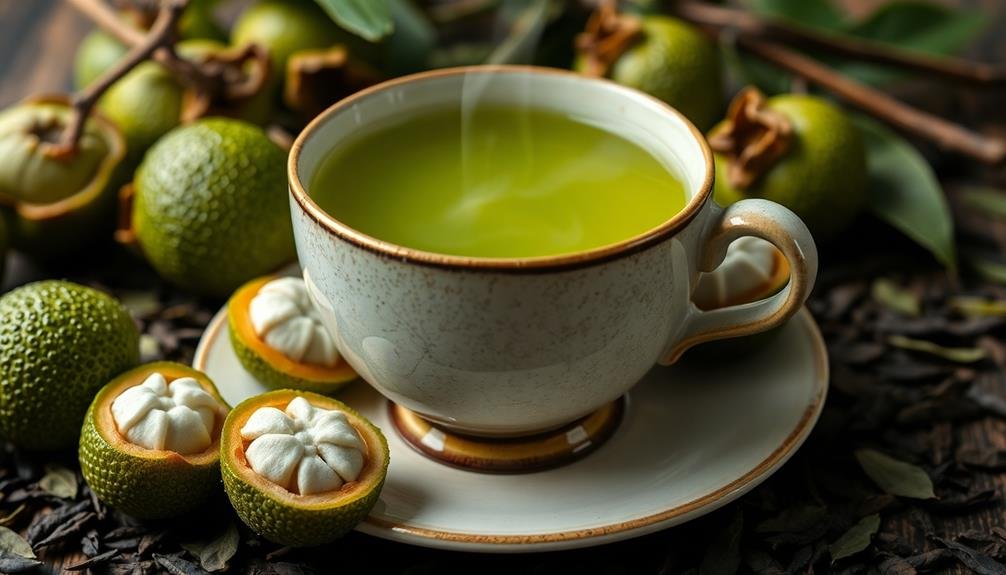
You'll find monk fruit sweetener to be a zero-calorie, natural alternative to sugar with potential health benefits, including antioxidant properties.
Its taste is often described as clean and sweet, without the bitter aftertaste associated with some artificial sweeteners.
You can easily incorporate monk fruit sweetener into your tea routine by adding it directly to your cup or using it in recipes that call for a sweetener.
Health Benefits of Monk Fruit
While monk fruit sweetener has gained popularity as a zero-calorie sugar alternative, it also boasts several health benefits that make it an attractive option for health-conscious individuals. This natural sweetener contains powerful antioxidants called mogrosides, which can help protect your cells from damage caused by free radicals.
Monk fruit extract may offer additional health benefits:
| Benefit | Description | Research Status |
|---|---|---|
| Blood Sugar Control | May help regulate glucose levels | Preliminary studies |
| Anti-inflammatory | Potential to reduce inflammation | Limited evidence |
| Weight Management | Zero calories, may aid weight loss | Anecdotal reports |
| Dental Health | Doesn't contribute to tooth decay | Well-established |
| Anti-cancer Properties | May inhibit tumor growth | Early-stage research |
You'll find that monk fruit sweetener doesn't raise blood sugar levels, making it suitable for people with diabetes or those following low-carb diets. It's also safe for children and pregnant women. However, more research is needed to fully understand its long-term effects and potential benefits. As with any dietary change, it's wise to consult your healthcare provider before incorporating monk fruit sweetener into your daily routine, especially if you have pre-existing health conditions.
Taste and Flavor Profile
Sweetness with a twist characterizes monk fruit's unique taste profile. You'll notice it's about 150-200 times sweeter than sugar, but with zero calories. Unlike artificial sweeteners, monk fruit doesn't leave a bitter aftertaste. Instead, you'll experience a clean, natural sweetness that lingers pleasantly.
When you use monk fruit to sweeten your tea, you'll find it enhances rather than overpowers the tea's natural flavors. It's particularly good at complementing green and white teas, bringing out their subtle notes without masking them.
Here's what you can expect from monk fruit's flavor profile:
- Initial burst of intense sweetness
- Fruity undertones reminiscent of melon or lychee
- A smooth, lingering finish without bitterness
You might detect a slight cooling effect on your palate, similar to mint but much milder. This unique characteristic sets monk fruit apart from other natural sweeteners.
As you experiment with different teas, you'll discover that monk fruit's versatility allows it to pair well with a wide range of flavors, from delicate floral notes to robust black teas.
How to Use It
Using monk fruit sweetener in your tea is straightforward and versatile. Start by adding a small amount, about 1/8 to 1/4 teaspoon, to your cup of hot or cold tea. Adjust the quantity to suit your taste preferences, as monk fruit is much sweeter than sugar. You can use it in any type of tea, from black to green to herbal blends.
For iced tea, dissolve the sweetener in hot water before adding it to your cold brew. This guarantees even distribution. If you're making a large batch, use about 1-2 teaspoons per quart of tea. Remember that a little goes a long way.
Here's a quick guide for using monk fruit sweetener in different tea preparations:
| Tea Type | Hot Tea | Iced Tea | Tea Latte |
|---|---|---|---|
| Black | 1/4 tsp | 1/2 tsp | 1/3 tsp |
| Green | 1/8 tsp | 1/4 tsp | 1/4 tsp |
| Herbal | 1/4 tsp | 1/2 tsp | 1/3 tsp |
| White | 1/8 tsp | 1/4 tsp | 1/4 tsp |
Experiment with these measurements to find your perfect level of sweetness. Monk fruit sweetener can also be used in tea-based desserts or smoothies for added flavor without the calories.
Xylitol From Birch Trees
Birch trees offer more than just scenic beauty; they're also the source of xylitol, a popular natural sweetener. This sugar alcohol has gained popularity as a low-calorie alternative to sugar, with a sweetness level similar to sucrose. Xylitol from birch trees is extracted from the wood through a process called xylan hydrolysis, which converts the xylan into xylose and then into xylitol.
You'll find xylitol particularly useful for sweetening tea due to its unique properties:
- Low glycemic index: It won't cause rapid spikes in blood sugar levels.
- Dental health benefits: It can help prevent tooth decay and reduce plaque formation.
- Heat-stable: It won't break down when added to hot beverages.
When using xylitol in your tea, start with small amounts and adjust to taste. It's about as sweet as sugar, so you can use it in a 1:1 ratio.
However, be aware that excessive consumption may cause digestive discomfort in some people. Also, while it's safe for humans, xylitol is toxic to dogs, so keep it out of their reach.
Organic Maple Syrup

While not technically sugar-free, organic maple syrup is a natural, minimally processed sweetener that's become increasingly popular for tea enthusiasts. It's derived from the sap of maple trees, primarily in North America, and contains trace minerals and antioxidants.
You'll find that maple syrup adds a distinct, rich flavor to your tea without overwhelming it. It's less refined than white sugar and has a lower glycemic index, meaning it won't cause as dramatic a spike in blood sugar levels.
When choosing maple syrup, opt for 100% pure, organic varieties to avoid additives and guarantee you're getting the highest quality product.
To use maple syrup in your tea, start with a small amount and adjust to taste. Its liquid form allows it to dissolve easily, even in cold brews. Remember that maple syrup is still high in calories and should be used in moderation.
It pairs particularly well with black teas, chai, and herbal blends like chamomile or rooibos. You can also experiment with infusing your tea with maple flavor by adding a splash to your brewing water.
Coconut Sugar
Coconut sugar, derived from the sap of coconut palm blossoms, has gained popularity among health-conscious tea drinkers in recent years.
It's a natural sweetener that offers a lower glycemic index compared to regular sugar, making it a preferred choice for those monitoring their blood sugar levels. Although it's not entirely sugar-free, coconut sugar contains trace amounts of nutrients like iron, zinc, and potassium.
When using coconut sugar in your tea, you'll notice a subtle caramel-like flavor that complements many tea varieties. It dissolves easily in hot liquids, making it convenient for both hot and iced teas.
Keep in mind that while coconut sugar is less processed than white sugar, it still contains calories and should be used in moderation.
Here are three key benefits of using coconut sugar in your tea:
- Lower glycemic index than regular sugar
- Contains small amounts of beneficial nutrients
- Offers a unique, subtle flavor profile
To use coconut sugar effectively, start with a small amount and adjust to taste.
Remember that it's slightly less sweet than regular sugar, so you may need to use a bit more to achieve your desired level of sweetness.
Experiment with different tea blends to find your perfect combination.
Agave Nectar
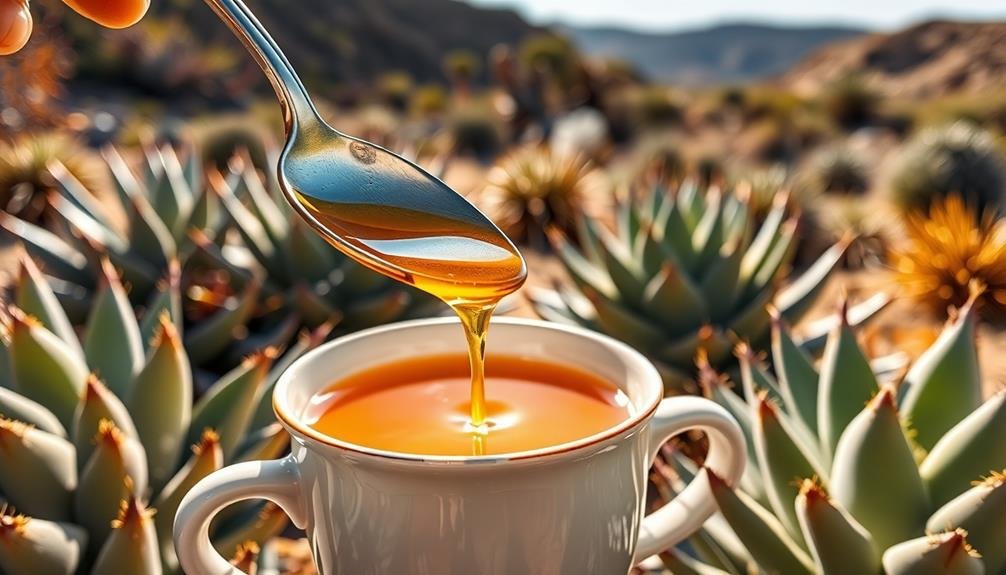
Derived from the agave plant, agave nectar is a popular natural sweetener that's often touted as a healthier alternative to sugar.
It's sweeter than regular sugar, so you'll need less to achieve the same level of sweetness in your tea. Agave nectar has a low glycemic index, which means it won't cause rapid spikes in blood sugar levels.
However, it's essential to recognize that agave nectar isn't calorie-free. It's high in fructose, which can be problematic when consumed in large amounts.
While it's a natural sweetener, it's still processed and refined. You should use it in moderation, just like any other sweetener.
When adding agave nectar to your tea, start with a small amount and adjust to taste. It dissolves easily in both hot and cold beverages, making it versatile for various tea preparations.
You'll find that agave nectar has a neutral flavor profile, allowing the natural taste of your tea to shine through. It's available in light and dark varieties, with the darker version having a slightly stronger flavor.
Licorice Root
Licorice root stands out among natural tea sweeteners due to its unique flavor profile and health benefits. You'll find that this sweet herb can transform your tea experience without adding any sugar. Its intense sweetness comes from glycyrrhizin, a compound that's up to 50 times sweeter than sucrose.
When you add licorice root to your tea, you're not just enhancing the flavor; you're also introducing potential health benefits. Licorice root has been used in traditional medicine for centuries, and modern research supports some of its purported effects. It's known for its anti-inflammatory and antioxidant properties, which may help boost your immune system and overall health.
However, it's important to use licorice root in moderation, as excessive consumption can lead to side effects.
Here are three ways you can incorporate licorice root into your tea routine:
- Steep dried licorice root along with your regular tea leaves
- Add a few drops of licorice root extract to your brewed tea
- Use licorice root tea bags for a convenient, pre-measured option
Remember to consult with your healthcare provider before regularly consuming licorice root, especially if you have any underlying health conditions.
Yacon Syrup
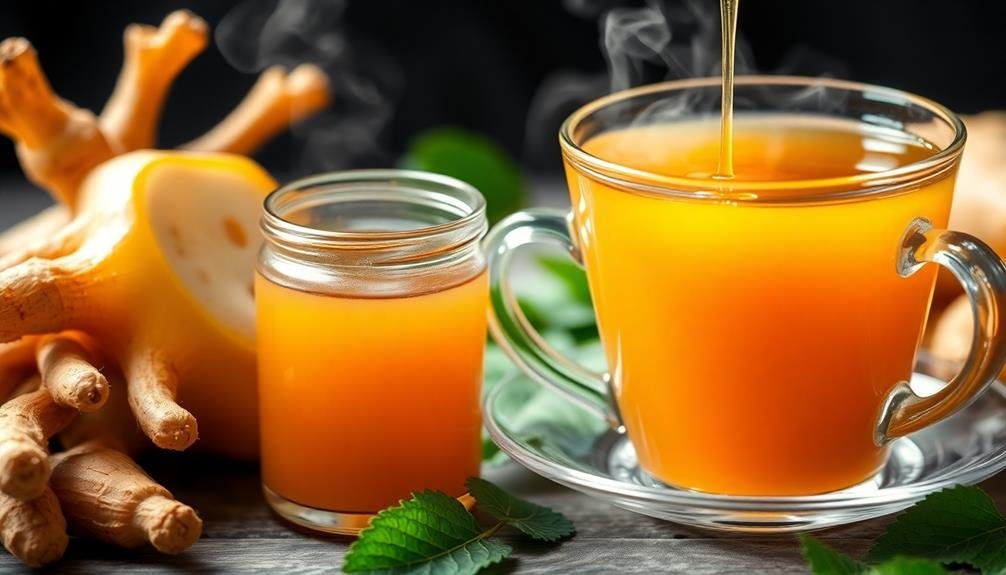
A lesser-known gem in the world of natural sweeteners, yacon syrup offers a unique solution for tea enthusiasts seeking a sugar-free option. Derived from the yacon plant native to South America, this syrup boasts a low glycemic index and contains fructooligosaccharides (FOS), a type of prebiotic fiber.
When you're looking to sweeten your tea without the caloric impact of sugar, yacon syrup can be an excellent choice. It has a distinct taste profile, often described as mildly sweet with caramel undertones. You'll find that it blends well with various tea types, enhancing flavors without overpowering them.
Yacon syrup isn't just about sweetness; it's also packed with potential health benefits. It may support digestive health due to its prebiotic properties, and some studies suggest it could aid in weight management. However, it's important to use it in moderation, as excessive consumption can lead to digestive discomfort.
When incorporating yacon syrup into your tea routine, start with small amounts and adjust to your taste preferences. You'll discover that a little goes a long way in providing sweetness while keeping your beverage sugar-free and nutritionally beneficial.
Frequently Asked Questions
Are There Any Potential Side Effects of Using Natural Sugar-Free Tea Sweeteners?
You should be aware that natural sugar-free sweeteners can have side effects. You might experience digestive issues, headaches, or allergic reactions. It's best to use them in moderation and consult your doctor if you have concerns.
How Do Natural Sweeteners Compare to Artificial Sweeteners in Terms of Calories?
You'll find that natural sweeteners often have fewer calories than sugar, but more than artificial sweeteners. While stevia and monk fruit are zero-calorie, others like honey or agave syrup contain some calories. It's best to use them moderately.
Can These Natural Sweeteners Be Used in Baking or Cooking?
You can use natural sweeteners in baking and cooking! They'll add sweetness and flavor to your dishes. However, you'll need to adjust recipes as they behave differently than sugar. Experiment with amounts and be prepared for texture changes.
Are These Sweeteners Safe for People With Diabetes or on Low-Carb Diets?
You'll find many natural sweeteners safe for diabetics and low-carb dieters. They won't spike blood sugar like regular sugar does. However, it's best to consult your doctor or nutritionist before adding any new sweeteners to your diet.
Do Natural Sweeteners Affect the Flavor Profile of Different Types of Tea?
Yes, natural sweeteners can alter your tea's flavor profile. You'll notice subtle changes depending on the sweetener and tea type. Honey adds floral notes, while stevia might introduce a slight aftertaste. Experiment to find your perfect combination.
In Summary
You've explored some great natural alternatives to sugar for sweetening your tea. Whether you're looking for zero-calorie options like stevia or monk fruit, or prefer the subtle flavors of raw honey or maple syrup, there's a choice for every palate. Remember, moderation is key even with natural sweeteners. Experiment with these options to find your perfect blend. You'll be sipping deliciously sweetened tea without the guilt or health concerns associated with refined sugar in no time.

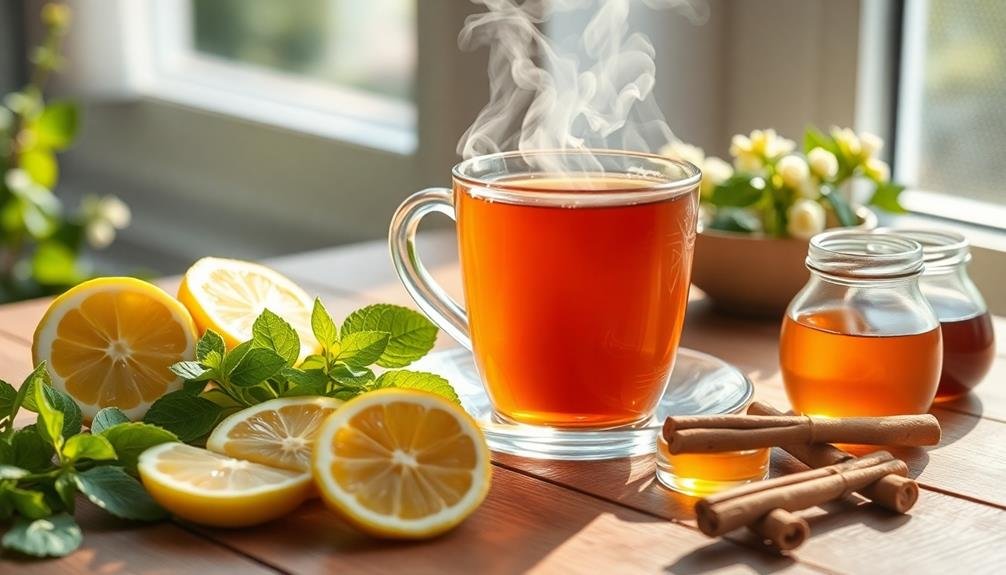


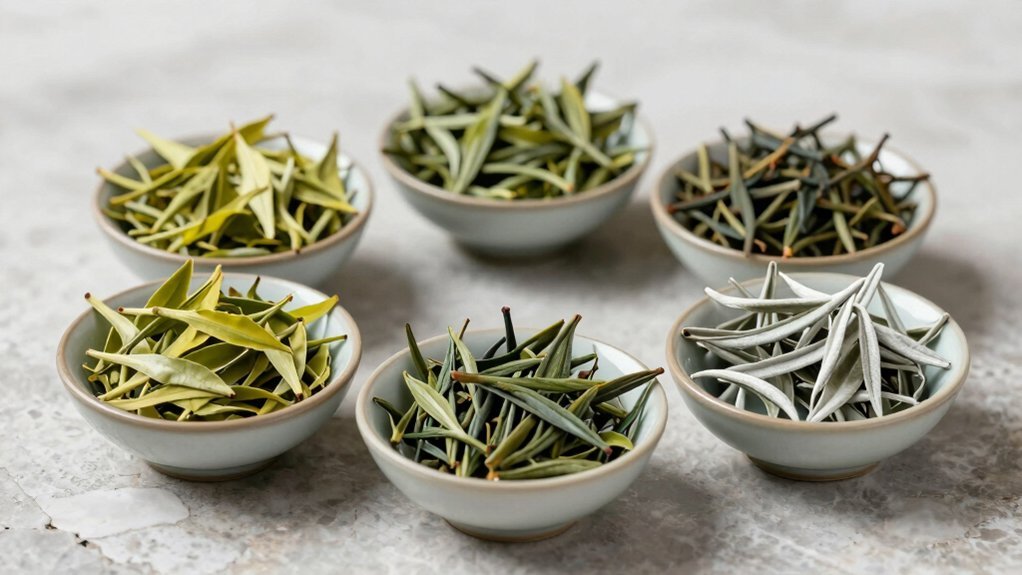
Leave a Reply